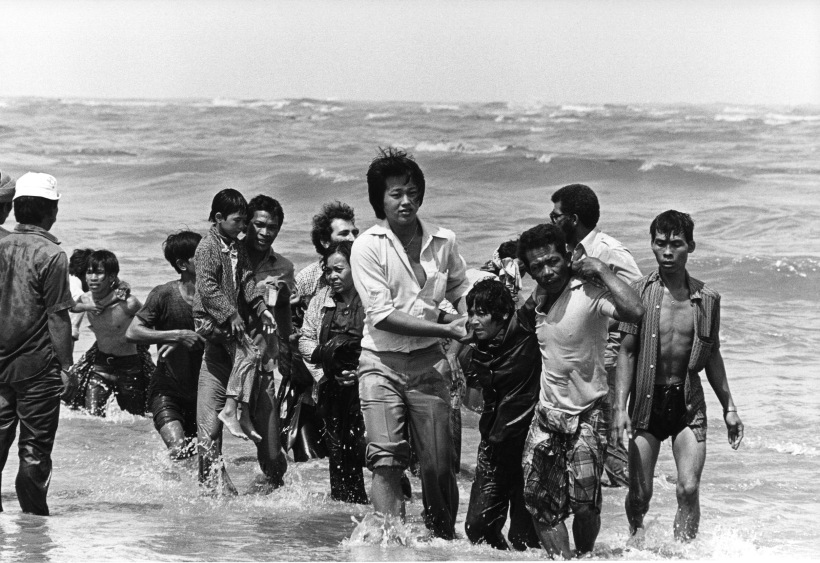When I look back to the Vietnam war, I can see that within less than half a century, the values that are rooted in the very fabric of American society have become threadbare. In order to further elaborate my argument, I examined three core aspects that have drastically changed over the past forty odd years: 1) immigration policies, 2) feminism, and 3) the pervasive acceptance of socialism. For the sake of length, the following two blog posts will be a series where I will only discuss the first topic in this post.
 Vietnamese refugees arriving on the shores of America, circa 1980
Vietnamese refugees arriving on the shores of America, circa 1980
On April 30, 1975, South Vietnam fell to communism, and the country became united under the doctrines of Karl Marx, Mao Zedong, Lenin, and Stalin – to only name a few of the socialist dictators that have killed over 100 million people within the last century, mainly by starvation and torture. Between 1975 and 1997, an estimated total of 1.6 million Vietnamese people fled to the United States to escape religious persecution while others sought economic opportunities (The Indochina Refugee Crisis). Of those 1.6 million that traveled by boat, an estimated 200-400 thousand were either killed by pirates or died by dehydration at sea. Considering how recent policies under the Trump administration guarantee an annual import of 1.8 million immigrants, it’s expected that legislators and politicians would share this same magnanimity in the 1970s.
In his final year as governor, Jerry Brown champions the idea of open borders and wholeheartedly embraces illegal immigrants – in spite of the manifold of implications regarding his decision, it all comes down to promoting diversity. But it comes as no surprise that forty years at the apex of politics can lead to a radical change of opinions. In his first year as California’s governor, Jerry Brown staunchly refused citizenship to the hundreds of thousands of Vietnamese and Cambodian refugees arriving on American soil. It’s pretty ironic for Americans to destroy another man’s home and then refuse the comfort of his own home. In this manner, Jerry Brown, along with his fellow Democrats, engaged in the worst form of ethnocentric rhetoric where Brown states, “There is something a little strange about saying, ‘Let’s bring in 500,000 more people,’ when we can’t take care of the one million out of work.”(Wall Street Journal).
 Hundreds of refugees crammed into boats designated for 30 people
Hundreds of refugees crammed into boats designated for 30 people
Today, statistics of unemployment have only been exacerbated with the overexploitation of welfare and entitlements, with currently 35% or 114 million Americans on welfare and an upwards of half a million transients wandering the streets aimlessly (Important Welfare Statistics for 2019). Suddenly, the math doesn’t seem to add up as to why America is in desperate need of immigrants to fill in jobs when 70% of menial labor is expected to be replaced by automation within the next decade. The economic ramifications of accepting immigrants, who not only undercut their American counterparts but would, too, be out of a job compared to its android equivalent. America’s so-called xenophobia towards immigrants was hardly a fringe view at the time. Polls showed that only 37% of Americans welcome the refugees while an overwhelming 49% were against Vietnamese refugees (Quartz & The Vietnamese Boat People). But that rhetorical landscape has since changed and radicalized to condemn those who oppose (illegal) immigration. At the price of freedom, families were willing to risk rape, abduction, and the total upheaval of their heritage to turn a new leaf in a new world devoid of their customs and language. It’s a pity for the 700,000 Vietnamese and Cambodian refugees that traversed nearly 8,000 miles of the Pacific Ocean only to be refused sanctuary at America’s doors.
At the foot of the upcoming election lies the imperativeness for Americans to revisit the so-called hypocrisy that plagues policies on immigration. I implore my fellow millennials and Generation Z’s to reconsider the conservative view Americans once held towards immigration and ask themselves if the price of diversity, at this point in time, is worth putting the needs of fellow Americans on the back burner once more.
I think it’s time we put ourselves first.
Works Cited
Whittaker, Alicia, and Alicia Whittaker. “Don’t Rock the Boat.” Medium, DST 3880W Summer 2018, 20 June 2018, medium.com/dst-3880w-summer-2018/dont-rock-the-boat-44e58b4f54f3. (Featured image)
Wain, Barry. “Foreign Affairs .” The Indochina Refugee Crisis , vol. 58, no. 1, 1979, pp. 160–180.
D’Hippolito, Joseph. “When Jerry Brown Tried to Keep Immigrants Out of California.” The Wall Street Journal, Dow Jones & Company, 9 Mar. 2018, http://www.wsj.com/articles/when-jerry-brown-tried-to-keep-immigrants-out-of-california-1520634989.
Thu-Huong Ha, Thu-Huong Ha. “Forty-One Years Ago, the US Took a Big Gamble on Vietnamese Refugees.” Quartz, Quartz, 20 May 2016, qz.com/670921/forty-one-years-ago-the-us-took-a-big-gamble-on-vietnamese-refugees/.
“The Vietnamese Boat People.” Association for Diplomatic Studies and Training, 16 Mar. 2018, adst.org/2014/07/the-vietnamese-boat-people/.
US Census Bureau. “21.3% Of US Participates in Government Assistance Programs Each Month.” The United States Census Bureau, 7 Jan. 2017, http://www.census.gov/newsroom/press-releases/2015/cb15-97.html.
Lexington Law. “45 Important Welfare Statistics for 2019.” Lexington Law, http://www.lexingtonlaw.com/blog/finance/welfare-statistics.html.
“The 35.4 Percent: 109,631,000 on Welfare.” CNS News, 3 Oct. 2014, http://www.cnsnews.com/commentary/terence-p-jeffrey/354-percent-109631000-welfare.